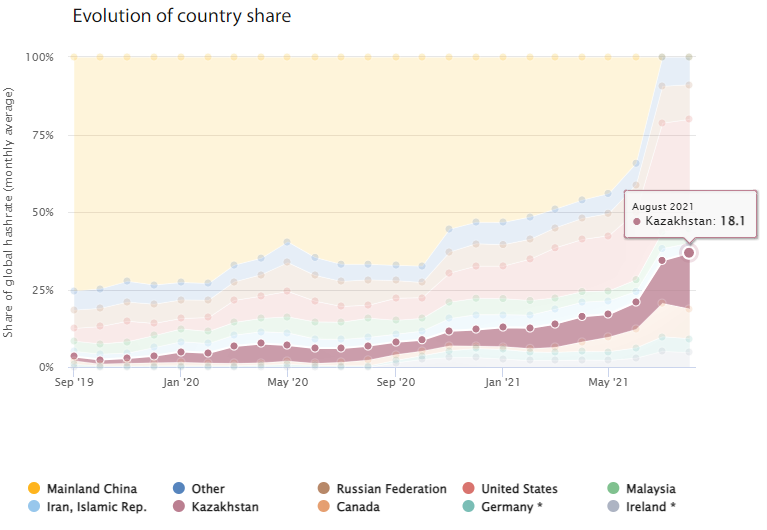Peacefully, the first morning rays of sunlight shine through the solid brick wall, which is fully covered with fresh green shrubbery in a friendly play of colors between red and green clover, ivy and herbaceous plants, just peeking imperceptibly through the thicket. The cool morning breeze fills our ribcage and calms in the same way as it inspires us: "nothing weighs us down, a life together and an eternity if we are allowed to live longer."
Sadly, the picture of the situation in Kazakhstan is a completely different one. The order to fire on protesters yesterday on Friday morning without negotiation shows how serious and grave this issue is. Political analyst Dosym Satpayev states that
[t]he authorities are trying everything to calm things down, with a mix of promises and threats, but so far it's not working [..] There will be imitations of dialogue but essentially the regime will respond with force because they have no other tools.
Some of you may know that I've been cryptopolitically active for some time now, and since last year I've also been officially fighting for greencrypto within Volt Europa. Kazakhstan’s internet outages are undoubtedly a catastrophe for free speech and the exchange of information (an information war?). From a cryptopolitical point of view, the Bitcoin mining mystery has been uncovered in the chaos and struggles for democracy, which shall be the main topic of this blogpost.
Political Background
Protests had already started on January 2 due to rising gas prices. Many Kazakhs use liquefied petroleum gas because it is cheaper than gasoline. The government had initially justified the high prices as a result of increased demand. Despite subsequent reductions in gas prices by Kazakhstan's president Kassym-Jomart Tokayev, the protests could not be ended.
Since January 5, the entire country has been affected by several internet shutdowns. It is possible that the government authorities wanted to prevent further protests. Kazakhstan has a long history of such measures, for example, communication was restricted during elections and the National Victory Day. According to a BBC report, the former president Nursultan Nazarbayev, who still held a strong position of power after his allegedly official resignation, also added up to the population’s anger in the country.
[The protesters are] asking for a change in power, freedom for civil rights activists, and a return to a 1993 version of the constitution, which is considered to have a more democratic tone and a clearer division of power than the current one. Tokayev also promised to ‘turn the Internet back on’ […] but warned it will be accessible only for certain periods of time and highly monitored by the government. ‘Free access to the Internet does not mean you can freely post your musings, slander and insults, your incitements and calls,’ he said.
The extreme situation is certainly difficult to compare with our much more advanced democracy in Europe, yet I was reminded of the so-called investment punk from Vienna who has always preached about how different people are. I have taken his views against gender mainstreaming seriously to heart, because even if many of our struggles for democracy fortunately do not take place on the same scale of violence as in Kazakhstan, they are still our small-scale battles in everyday life. I doubt that such people as the investment punk enjoying the luxuries of our social achievements in Europe will ever understand why it’s necessary to fight for equal opportunities in societies. If a society becomes too unequal and is therefore perceived as severely unjust, upheavals happen and can no longer be justified with numbers or inflation alone.
Although Kazakhstan is an oil- and gas-rich nation, many people live in poverty. The Eastern Military Alliance (CSTO), is organized in a similar way as NATO, with the difference that CSTO is headed by Russia and that cooperation occurs more quickly and troops are already sent to allied territories in the event of inner-national civil unrest. The fact that the wave of protesters has had a certain degree of success in toppling a government, specifically prime minister Askar Mamin's dismissal is certainly viewed with caution by Russia as even the slightest concessions to a democratic value system mean a loss of power for authoritarian regimes.
Crypto Situation
The mining situation cannot be viewed separately from China and its miners who sought refuge in Kazakhstan in response to the Chinese crypto ban drying out its crypto mining industry between April and September 2021. It's obvious that large mining companies had the ability and resources to expand to North America and Europe with its more stable regulatory frameworks and a politically safer environment, while smaller mining companies had to settle in Kazakhstan.
Kazakhstan's president, Kassym-Jomart Tokayev, who saw the opportunity and introduced regulations and a tax regime, has been headlined by the media as giving green light to cryptocurrency mining. That Kazakhstan's electricity production is anything but green, and that nearly 70% is generated from coal, is further exacerbated by the fact that Kazakhstan's plants are among the oldest in the world, making coal production least efficient. Fortune's statement
The International Energy Agency [IEA] reckons that Chinese coal emitted around 1000 grams of CO2 per kilowatt hour, and that Kazakhstan's hard coal variety coughs up far more around 1500 grams.
does not include exact referencing and no further literature. After checking IEA sources and conducting additional research @sciencevienna, the correctness of Fortune's statement cannot be confirmed. Due to the fact that the article is behind a paywall, the magazine’s claims are probably not meant to be verified. However, Kazakhstan's influence on the climate crisis is not insignificant and could further be studied within a comparative perspective of climate change performance. To which extent Tokayev’s measures aimed at reducing CO2 emissions could have been effective must be assessed elsewhere as the protection of the environment cannot be coerced by one authoritarian regime but needs to be understood and prioritized by citizens.
When a government is busy maintaining its image of a seemingly well-functioning authoritarian regime and tries to sweep corruption under the rug so that the superordinate regime does not also run the risk of being further democratized, then long-term issues for the future, which are more far-reaching than any legislative period or lifetime presidency ever could be, cannot be prioritized. Protecting our environment is a long-term project. Can there be peace without democracy?
Negotiations and the possibility of dialogues are foundations for enabling us to participate in our common future and that of our children. If peace does not include dialogue, then it is perverted into an inner silence of fear that is more like repression than actual active participation and co-creation. In any case, violence, as much as fear or repression, can never be a good solution.
Solving the Bitcoin Mining Mystery
How much Bitcoin was really mined with the super-dirty coal in Kazakhstan has been a mystery until now. Cambridge University’s Bitcoin Electricity Consumption Index (CBECI) provides the data estimating that at the end of August Kazakhstan hosted 18.10% of all Bitcoin mining, in second position to the United States. At this point, thanks @inigo-montoya-jr for your deep dive and asking whether Kazakhstan could be part of the US “Great Game” against Russia.
Larry Cermak of The Block reported a 12% drop in the first few hours when the internet has gone out in Kazakhstan and the miners have been cut off from the Bitcoin network. The website Digiconomist follows Bitcoin’s carbon footprint and supposedly claims a drop of even more than 18% “as the outage takes its full toll”. The operator of the Digiconomist Alex de Vries is obviously situated in the fiat world and most of his research is hidden behind Elsevier paywalls. It would be interesting to analyse the reliability of his research, his methodology and thought collective philosophically in the sense and spirit of Ludwik Fleck. Alex de Vries' main employment career as central banker and odd social media activity on twitter ruminating and resharing now and then the same old postings in intention of bashing does not make him appear more trustworthy.
Spurring Greencrypto?
Before even starting with greencrypto, myths should be cleared up, also bashing isn’t advised of being a good strategy and should be avoided. What the internet shutdown has also shown, in addition to shedding light on the Bitcoin mining mystery, is that Tokayev's law, which was intended to control Bitcoin mining by limiting the amount of power available to newcomers, has failed miserably. Thus, nothing can be achieved by traditional political means. In fact, outdated politics is not the same as cryptopolitics. This time, refugee miners will take a more critical view of the situation and ask themselves whether, for example, neighboring Russia would really be such a better alternative if Russian troops are already invading Kazakhstan via the CSTO alliance. The easy solutions are very often not the best ones - in the long run.
Given that Kazakhstan's government now has more pressing issues to deal with, it is unlikely they’ll have environmentally friendly development plans on their agenda. The reorientation of the current Kazakh Bitcoin miners whose personal safety is at risk could lead the way towards more stable and flexible operating conditions, to ultimately provide an opportunity for greencrypto. Countries of the West with a higher degree of democratic development have already green hydraulic power and geothermical power in place to just mention a few, "the cheapest source of power in the world" or “other creative ways to mine cryptocurrencies sustainably” and at the same time co-creating subsidized housing without government intervention. Kazakhstan’s internet outages may have led to volatility in the short term but will eventually make miners rethink their time preference towards more stable, more democratic and greener alternatives for the long run, further geographically diversifying one of the fastest growing industries and unstoppable technologies of the future.


